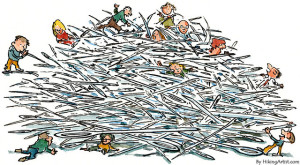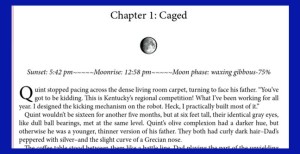Connie Williamson is the winner of our Terry Odell audiobook giveaway! Stay tuned for our upcoming 1000th post celebration, full of book giveaways and prizes.
Author Archives: Colette Black
I Hope You Noticed
What are the ways writers get noticed? Good hair, great covers, blind luck? Of course, there’s more to it than that and our posts this month were excellent at showing us the best ways to get our works noticed by the readers who will love them. In the end, I think our writers would all agree that it comes down to good business, good tools, good behavior, and good writing. Let’s look at a quick recap.
Business:
Guy Anthony De Marco started the month by talking conventions, the opportunity small conventions can provide for writers and the ways in which we can expand our reach to larger conventions in a larger geographic area. Travis D. Heerman echoed Guy’s views by helping us learn how to sell by loving what we do. Everywhere we go, we need to be prepared to find that Reader Zero. Scott Eder reminded us to always have business cards with us, even if we’re just going to the grocery store. Guests Doug Dandrige and Sean Golden gave overviews of what they think helps a self-published writer get noticed including Amazon giveaways, social media and reviews. Guest Petra Klarbrunn talked about reviews in more depth, their importance and some ways to encourage our readers to take the time for them. Last, but not least, we have Evan Braun getting noticed through our own Fictorians site as he shared his release of the third and final volume of his The Watchers Chronicle, The Law of Radiance. Sounds like a great book that I can’t wait to read.
Tools:
I was impressed with some of the tools mentioned by our contributors this month that can help us reach our target audience. Guest Katie J. Cross gave us a detailed how-to of putting together a local book tour. She inspired me to get my own tour together which resulted in two more book signings and a writing workshop in addition to my library book festival that to which I’d already been invited. Of course, local is all well and good, but getting noticed worldwide is even better. Guest Mark Leslie Lefebvre gave us inside information about getting noticed on Kobo, including new tools that are coming available to assist authors. With the increasing rise of audio books, Guest Terry Odell’s step-by-step guide is an invaluable resource that I will be referring to soon as I prepare for that next step in my publishing endeavors. Another great source of sales, whether we agree with their platform or not, is Goodreads. Frank Morin shared a great post on how to do a Goodreads Giveaway.
Behavior:
Mary Pletsch, Guest John D. Payne, Gregory Little, Nathan Barra, Ace Jordyn, David Carrico and Guest K.J. Russell would all agree that acting with kindness, relaxing a little, and making friends is one of the most important aspects of a writing career. By making friends with fellow writers, Mary enjoyed much success she hadn’t even looked for. John talked about having an attitude of success. Gregory reminds us to enjoy people without worrying over advantages while guest K.J. Russell tells us we will be the most successful when we make it our business to help others succeed. The best can happen if we find our interests, share with others, and enjoy what we do and David Carrico is a great example of that . If you haven’t read his 1632 books, you should. I loved Nathan’s post title, The Extroverted Introvert, reminding us to swallow our fear and put ourselves out there a bit. All in all, the most important advice on behavior that I found was from Ace; when things don’t go as expected, laugh it off, let others laugh with you, find the humor and just keep going.
Writing:
In the end, none of this is going to matter unless you write an intriguing story. I loved Matt Jones’ unexpected advice to get involved with hobbies and activities of interest. By doing so, we have experiences to share with our readers and to draw upon with our writing. Kristin Luna reminded us to let our writing style shine, making us identifiable to readers and always unique. Drawing on a presentation by Kevin J. Anderson at the Superstars Seminar, Jace Killan used the metaphors of Rodeos and Popcorn to remind us that perseverence and a continuous output of product will keep us sharp and multiply our opportunities. And the last post of the month (besides this one) sums it all up. Good Writing Gets Noticed, by Kim May. After all, none of the above works unless we hone our skills.
I hope you’ve enjoyed this month’s posts as much as I have. I know I’ve learned a lot that I will be applying in the weeks and months to come. Some of it I’d heard before, some of it was old, but all of the advice is absolutely valuable.
Getting Noticed
 Ever feel like a needle in a haystack? Perhaps more accurate, a needle in a huge pile of other needles. We write, we publish, we go to conventions and yet somehow reaching readers seems to become more and more difficult. Perhaps they feel inundated by the “buy me” media, they have their favorite authors and have difficulty branching out, or they just plain don’t realize how much they need our books. What can we possibly do to even have a chance at the love and authorly acceptance we so desperately crave…along with a few more book sales, please?
Ever feel like a needle in a haystack? Perhaps more accurate, a needle in a huge pile of other needles. We write, we publish, we go to conventions and yet somehow reaching readers seems to become more and more difficult. Perhaps they feel inundated by the “buy me” media, they have their favorite authors and have difficulty branching out, or they just plain don’t realize how much they need our books. What can we possibly do to even have a chance at the love and authorly acceptance we so desperately crave…along with a few more book sales, please?
Those questions are the Fictorians’ June focus. We want to help you know how to get your books, stories, poetry, or whatever your creative work, into the hands of the people who can love them best. As much as I’ve looked for the perfect formula online, in bookstores, and in my supposedly creative brain, this seems to be the subject that stumps me the most. From my conversations with other authors, I think I’m not alone.
Last month we talked about the writing tools. Great month, by the way. So, we have everything in line to create a great book. Are we only writing for ourselves? If not, then how do we get these great masterpieces noticed?
This month we’ll be talking about the usefulness, pros and cons, and possible outcomes of activities such as:
- Book Launches
- Social media
- Selling at conventions
- Community contacts
- Working with film makers
- Targeting Indie Readers
- And more…
So, let’s combine our collective needles of knowledge and I know that we can help eachother get to the top of the stack, the sun glinting off the spectacular surfaces of our books and catching the eyes of our potential readers.
I’m looking forward to this one, and I hope you are, too.
The Magic of Jutoh
 As I said about Scrivener in my previous post, Jutoh is also a software program that can make you cry with joy or frustration…probably both. In both cases, I had to spend a lot of time on Youtube, forums, and the help page in order to figure it out. Other than the fact that they’re both extremely useful, the similarities end there.
As I said about Scrivener in my previous post, Jutoh is also a software program that can make you cry with joy or frustration…probably both. In both cases, I had to spend a lot of time on Youtube, forums, and the help page in order to figure it out. Other than the fact that they’re both extremely useful, the similarities end there.
Jutoh is a program designed to take your already written book from word processor format to ebook format, and it does its job well, including links, artwork, font, drop-caps, etc. You can write within the program, but I wouldn’t generally suggest it. My only exception to that might be game design. When I put together my game module, The Hologames, for Sojourner Tales, I outlined the game elsewhere but because of the intra-document links required, it worked well to do the writing within Jutoh.
 Though I don’t generally use the program to write, I’ve never seen a program that can compile ebooks better, especially if you want some professional touches. To the right, you’ll see an example of a book manuscript in progress. This is the way it will look in epub format. This is a rough version, and I’m not finished with it yet, but it should get the point across. I can use graphics in my title or with my title, drop caps are a cinch, I can customize page breaks, etc.
Though I don’t generally use the program to write, I’ve never seen a program that can compile ebooks better, especially if you want some professional touches. To the right, you’ll see an example of a book manuscript in progress. This is the way it will look in epub format. This is a rough version, and I’m not finished with it yet, but it should get the point across. I can use graphics in my title or with my title, drop caps are a cinch, I can customize page breaks, etc.
When I’m done assembling my chapters, copyright page, title, contents (all linked, of course), glossary, author page, etc. I hit the “Compile” button and it puts everything together in the format of my choice: epub, mobi, ODT for smashwords (yes, this is a little different), and a number of other formats. I find that running my book through Jutoh then sending it back to Word in odt even makes for a cleaner document to prepare for pdfs and paper publishing markets.
Loading a document to createspace or kobi can be a fairly easy process, but often there are mistakes that you won’t see until your readers point them out to you. After compiling, Jutoh has another handy button, “Check.” Though problems that don’t really exist might come up, it tells you that it’s not likely a real problem. And real problems always come up. Wouldn’t you rather deal with them before you send your book out to the world instead of finding something you need to fix months after readers’ annoyance.
Last, but certainly not least, is the “Launch” button. With the download of a couple of other free software programs, Jutoh allows you to view your finished document in mobi, epub, and other formats. I can’t tell you how many mistakes I’ve caught just by looking at my book as it will appear to readers. It may be aggravating to fix, but it’s nice to get that aggravation over and have the confidence of a well-done product when you launch.
Last year, I won the first-ever IndieRecon Live Total Package Book Award. I credit much of that success to Jutoh. I put in a well-written novel, and Jutoh helped me knock out a great looking format. The combination allowed me my blissful moment of fame.
How about you? What’s your favorite way to get your book out into the world?

Colette Black lives in the far outskirts of Phoenix, Arizona with her family, 2 dogs, a mischievous cat and the occasional unwanted scorpion. She loves learning new things, vacations, and the color purple. She writes New Adult and Young Adult sci-fi and fantasy novels with kick-butt characters, lots of action, and always a touch of romance.
